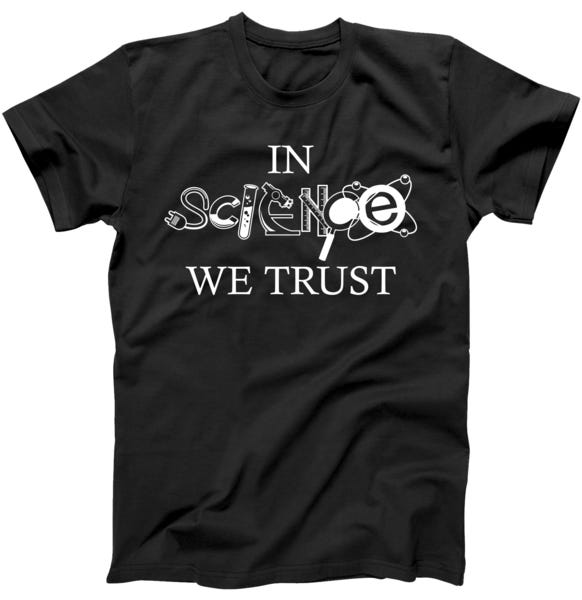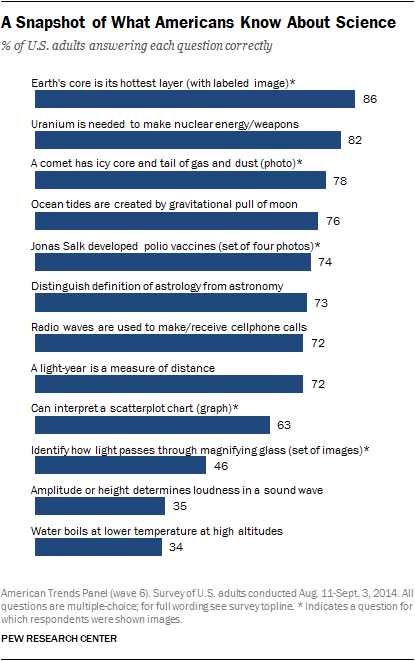
When Scientists Act Like Denialists
Science communicators should embody what their fans value most.
Michael Specter described denialism as “denial writ large,” where a large segment of society turns away from reality. What’s real are matters of facts, scientific consensus and evidence. What’s unreal are the products of irrationality and delusion. But it’s more than disagreement or debate. To level a claim of denialism is to weaponize the disagreement. When rational opposition has been exhausted, dark motives and corruption are all that remain.
Debate is essential in science. “If they weren’t criticizing one another, and disagreeing with one another, we wouldn’t have the grounds to trust the results of science the way that we do,” the philosopher James Weatherall explained. Disagreement ends in denialism, however, when it moves beyond peer review and into the dark. “It reflects a person who is no longer producing work of a sort that can meaningfully convince their peers of anything. So now they’re trying to convince people who are less equipped to evaluate it.”
I’m one of those less equipped people, a humble science fan. By way of introduction, consider my anti-denialist bona fides: I think the earth is round, evolution is true, HIV causes AIDs, humans cause climate change, nuclear energy would help, men have walked on the moon, vaccines are essential, genetically modified crops are safe, and Pete Hegseth should really wash his hands.
If my testimonial reads like a religious creed, it’s because it has to. What’s the first thing you consider as you wade into the cesspool of denialism? Is it the argument or the author’s identity?
But here’s the really vexing part: Some portion of my beliefs will offend pretty much everyone. There are few enduring allegiances in denialism. Cary Funk, director of science and society research at Pew Research Center reported, “past studies have shown no single background factor such as politics, education, age, race/ethnicity, gender or region consistently predicts who among the public is more skeptical of prevailing scientific consensus.” Specter would agree. “Denialism is not green or religious or anti-intellectual, nor is it confined to utopian dreamers, agrarians, or hippies. It is not right- or left-wing; it is a fear expressed as frequently and with as much fervor by Oxford dons as by bus drivers.”
Under the present rules of engagement, denialism is a nightmare of guerrilla warfare. Oxford dons and bus drivers emerging suddenly at your dinner party, indiscriminately spraying their denials before disappearing again into the night.

There’s a popular explanation for the rise of denialism, called Brandolini’s law, or the bullshit asymmetry principle: The amount of energy needed to refute bullshit is an order of magnitude bigger than to produce it. It’s an old idea dressed in a shiny new meme. You might recognize it as “falsehood flies, and the truth comes limping after it,” or “a lie will go round the world while truth is pulling its boots on.”
Why does truth travel slower than fiction? Specter suggests that denialism is rooted in fear and a loss of control, “an attempt to scale the world to dimensions we can comprehend.” Denial is an aversion to complexity. Reality is hard and denialists offer simple intuitive explanations. Others marshal Daniel Kahneman’s fast and slow thinking to explain the disparity. Due to its complexity, reality requires slow, deliberate thinking. Denial, on the other hand, travels on fast, emotional thinking. Fast thinking is easily hacked by bullshit artists.
By these accounts, the good guys are at an inherent disadvantage in the war against science. Reality is hard, denial is easy. Reality is slow, denial is quick. Reality is elite, while denial welcomes everyone.
And that’s why we’re losing the science wars.
The amount of energy needed to refute bullshit is an order of magnitude bigger than to produce it. — Brandolini’s law
I certainly can’t refute these explanations. Generalized accounts of large and shifting populations are hard that way, just as solutions based on these amorphous targets have proved ineffective. They leave us lurching from one ineffective solution to another. So forgive me as I call bullshit on Brandolini’s law, not as unreal, but as a just-so story that offers little in the way of remedies.
Ironically, as the science wars become more desperate, the solutions are becoming increasingly anti-science.
The most time-honored and popular anti-science tactic is the appeal to authority. If the explanations are too complex and opponents unworthy, just trust the experts. The environmental scholar, Andrew J. Hoffman, compared appeals to authority in this modern context to the tactics of the Catholic church in response to the printing press. It’s an intentionally inflammatory comparison. He warned, “I hope this comparison offers a compelling provocation for the scientific community to come to grips with the cataclysmic changes we are now living through and ignore at our peril.” If you want to make mass market appeals to scientific identity or authority, just sell the t-shirt.

Maybe we should go full Michael Avenatti on them. Rod Lamberts, deputy director of the Australian National Centre for Public Awareness of Science (CPAS), claimed the ends justify the means. We need to fight fire with fire. “There’s no profit in trying to change the position of deniers. Their values and motivations are fundamentally different to those of us who listen to what the weight of scientific evidence tell us. So forget them.” Unfortunately, to ignore your opponents is to deny them. It may temporarily bury the debate, but buried ideas often rise from the dead in more destructive forms.
Here’s another classic from the denialism playbook: scare them. Robyn Urback offered some vivid examples of how the tactic could be turned against anti-vaxxers. “Show them what a child hospitalized with measles-induced encephalitis looks like. Tell stories like that of Jamie Schanbaum, whose legs and fingers were amputated after she contracted meningitis as a Texas University student. Let them see what it’s like for a baby with whooping cough try to struggle to breathe.”
I feel her exasperation, particularly as it relates to vaccinations. But I worry about the prospects for a scare-mongering arms race. If denialism is rooted in fear, will a controlled burn extinguish the fire? Can fear be directed and contained when online it rages out of control? Such is the gambit of fear.
There may be wisdom in these tactics, but not as a vehicle for science communications. We know this because droves of science communicators are already fighting their opponents with denialism. They’re routinely wrapping their scientific arguments in pseudoscientific rhetoric, indulging in the same quality of sloppy talk and rancorous debate. And this clumsy dance between their scientific subject matter and their unscientific tactics makes them ineffective and vulnerable to counter attacks.
And that’s why we’re losing the science wars.
On one point, everyone seems to agree: facts aren’t working. Denialists are impervious to facts, often doubling down on their false beliefs in response. Like judo, tactics of rational criticism may be turned around. Denialists know all about cognitive biases, logical fallacies, ideological commitments, and most importantly, the provisional nature of scientific explanations. Paradoxically, scientific literacy can make beliefs more resilient against criticism.
This apparent paradox points to a more discriminating solution.
Discussions of scientific literacy mistakenly center on questions of basic facts across a range of topics. For example, you might not know that the volume of a sound is determined by its amplitude, rather than its frequency. This attitude is reinforced by countless polls and late show skits demonstrating our inability to name famous scientists (“Charles Dickens?”) or the meaning of terms like GMO (“Genetically manufactured…oh?”).

But just as statements of fact are ineffective against denialism, knowledge of facts is an imperfect proxy for scientific literacy. Like scientists, the laity tends to focus on a small set of interests. These specializations are reflected in social media, our main source of science information. When you’re not required to study every subject on the “basic facts test,” you’ll tend to get many of the answers wrong. So what? This doesn’t disqualify you from science fandom.
A modern view of science literacy is much deeper, according to the National Academies. “More than just basic knowledge of science facts, contemporary definitions of science literacy have expanded to include understandings of scientific processes and practices, familiarity with how science and scientists work, a capacity to weigh and evaluate the products of science, and an ability to engage in civic decisions about the value of science.” We’re not convinced by facts because science isn’t an accumulation of facts. Science is the pursuit of good explanations and we thrill in the pursuit.
Science fans don’t need to be experts to recognize and reject unscientific tactics.
More than a litany of facts, our interest in science instills knowledge of its methods and values. This impression is heightened in the public imagination, far above the lived reality of scientists. Popular science is presented in an idealized form, stripped of its human foibles and messy deliberations. Through these exalted presentations, science becomes a subject of reverence among fans. This explains why the public has come to embrace the tools of science and rational discourse.
Here’s the rub: Science fans don’t need to be experts to recognize and reject unscientific tactics. Just as children understand the motives of their feuding parents, the public understands these debates at a level deeper than facts. When arguments are debased by unscientific rhetoric and misdeeds, it taints not only the message, but the messenger, too.
Just as they misunderstand their fans, science communicators frequently overshoot their targets as well. If we want to win the science wars we need to recognize that science isn’t for everyone. It would take the energy of 25 million global nuclear arsenals detonating simultaneously to boil the ocean. But this effort pales next to the energy required to convert denialists.
Yes, there’s a shockingly high proportion of scientifically disinterested people out there. But there’s also a committed battalion of science fans that value the values of science. If denialism is tribal, focus on our tribe and communicate in a manner befitting this enlightened tradition.
To act otherwise is denial.
